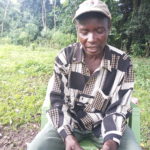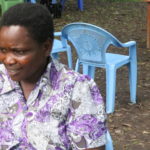Lack of pads, poverty push Siaya girls to early pregnancies

Lack of pads, poverty push Siaya girls to early pregnancies
By Lilian Kaivilu
@liliankaivilu
Esther Atieno is a Form Three student at Dibuoro Secondary School in Siaya County. To her peers, Atieno is just any other student going about her studies. But far from it. At the age of 18, she has mastered the art of balancing between school and motherhood. At only 13 years, Atieno entered the demanding world of motherhood.
Her case paints the grim picture of the more than 2.5 million girls across the globe who give birth before the age of 16.
The mother of a four-year-old boy has taken up casual work in order to pay her school fees while feeding her baby. When she got her baby, Atieno was still a primary school pupil at Dibuoro Primary School. She joins the list of young girls that, according to the Kenya Demographic and Health survey 2014, place Nyanza region on the top of areas with the youngest mothers in the country.

Disappointed at the quick turn of events for the bright and promising student, Atieno’s mother Margaret Ogola chased her daughter out of their home. “I was very sad that my daughter got pregnant at a very young age. That is why I chased her away. I later learnt that she sought refuge from one of her sisters,” says Ogola.
But after going through counseling sessions with a community health worker in Lugega Community health unit, Ogola says she learnt to accept her daughter. “That is when I took her back to school. I am now helping other woken to accept their daughters.”
In order to sustain herself and the baby, Atieno is currently working in local rice farms to raise her own school fees as well as that of her son who is in baby class. The 18-year-old joins the list of other age mates in the county who are now teenage mothers. According to the Kenya Demographic and Health survey 2014, 15 percent of Kenyan women have sex before their 15th birthday.
Atieno is currently in Sh24,000 fees arrears from her high school. Besides, her son is required to pay Sh1,500 every academic term. And with her Sh200 daily earnings at a rice plantation, she can hardly meet her needs. “Being a young mother is costly, especially when you have no income,” she says.
Lydia Auma Omondi knows this all too well. The mother of a two-year old son has been home since the lecturers’ strike kicked off. And with no source of income to pay her university fees at Kabianga University, Auma has started a grocery stand in Rwambua shopping centre.

With her son by her side, the Bachelor of Commerce student braves the scorching sun to beat her sales targets by the end of the day. At about three o’clock, Auma lights her charcoal jiko ready to start her daily business. This has been her activity every school holiday since 2016 when she delivered her son.
Jared Orsborn Oketch, an opinion leader in Nyadorera sub location blames ignorance among teenage girls for the rampant cases of under age pregnancies. According to him, family planning commodities will not solve the problem. “Giving the girls contraceptives is like licensing them to have illicit sex. Let the girls be given information on the dangers of irresponsible sex,” he says.

To Jane Stellar, life has been difficult since she delivered her baby last year. The last born in a family of six had just completed her studies at Bukhoba Primary school when she learnt she was pregnant. “I needed money for sanitary pads which my then boyfriend offered,” says Stellar. But it was in exchange for sex. The 18-year-old remembers how the father of her daughter discouraged her from using any protection or family planning method.
“He told me that contraceptives were only to be used by women who had already given birth. In my naivety I believed him and had unprotected sex,” she remembers.
Stellar who sat her Kenya Certificate of Primary Education (KCPE) examination in 2016 scored 250 out of 500 marks is yet to join secondary school. Although she is still in touch with the father of her daughter, Stellar says the sand harvester does not make enough money for the child’s upkeep. “That is why he cannot afford my school fees as well. I am hoping to join high school as son as I get finances.”

Annastacia Adongo Ouma, a community health volunteer at Ndadorera B community unit blames poverty and lack of access to sanitary pads as the leading causes of teen pregnancy in the area. “Girls here are not given sanitary pads in school. In most cases, the school will only give the girl a pad only when she starts her menstruation during school hours. The boyfriends have noticed this gap and they are taking advantage of it to exploit the girls sexually in exchange for pads, says Ouma. According to her, schools should regularly provide sanitary pads to all adolescent girls.

